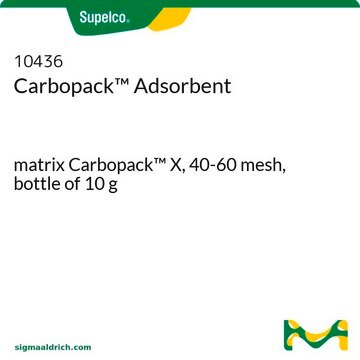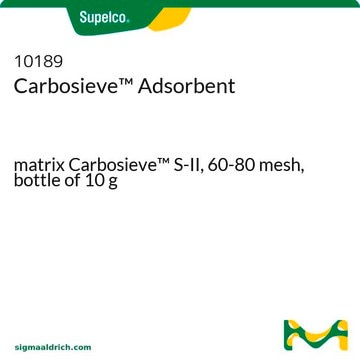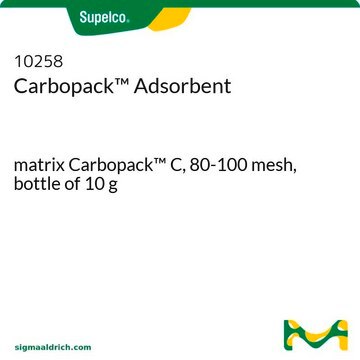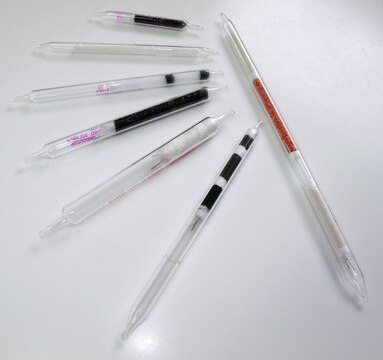10477-U
Carboxen® Adsorbent
matrix Carboxen® 1000, 40-60 mesh, bottle of 50 g
About This Item
Recommended Products
product line
Carboxen®
form
powder
packaging
bottle of 50 g
technique(s)
LPLC: suitable
surface area
~1200 m2/g
matrix
Carboxen® 1000
matrix active group
carbon
particle size
40-60 mesh
pore size
~0.16 cm3/g mesoporosity
~0.25 cm3/g macroporosity
~0.44 cm3/g microporosity
~10-12 Å pore diameter
density
~0.50 g/mL (free fall density)
separation technique
reversed phase
Looking for similar products? Visit Product Comparison Guide
General description
Application
- Evaluation of selected solid adsorbents for passive sampling of atmospheric oil and natural gas non-methane hydrocarbons: This study assesses different adsorbents including Carboxen for capturing non-methane hydrocarbons in the air, crucial for environmental monitoring and regulatory compliance (Helmig et al., 2022).
- Application of Thin-Film Microextraction to Analyze Volatile Metabolites in A549 Cancer Cells: Discusses the application of Carboxen adsorbents in microextraction techniques for analyzing volatile compounds from cancer cells, demonstrating its utility in medical research and diagnostics (Filipiak et al., 2021).
- Analysis of volatile organic compounds in indoor environments: The study uses Carboxen adsorbents for sampling and analysis of indoor air pollutants through gas chromatography, highlighting its application in improving indoor air quality and health (Veenaas et al., 2020).
- New approach to resolve the humidity problem in VOC determination in outdoor air samples: This research addresses challenges in using Carboxen adsorbents for environmental VOC sampling, emphasizing improvements in the accuracy of air quality assessments (Maceira et al., 2017).
- Measurement of breakthrough volumes of volatile chemical warfare agents on a poly(2,6-diphenylphenylene oxide)-based adsorbent: This paper evaluates the efficiency of Carboxen adsorbents in capturing chemical warfare agents, indicating its potential in security and environmental protection applications (Kanamori-Kataoka et al., 2015).
Features and Benefits
- Spherical
- Hard (ball pan hardness >98%)
- Stable up to 400°C
- High purity
- Easy to pack
- Stable over entire pH range
- Do not create backpressure
- High osmotic shock stability
- Tapered pore sizing (from macro- to meso- to micro-)
Other Notes
Legal Information
Storage Class
11 - Combustible Solids
wgk_germany
nwg
flash_point_f
Not applicable
flash_point_c
Not applicable
Choose from one of the most recent versions:
Certificates of Analysis (COA)
Sorry, we don't have COAs for this product available online at this time.
If you need assistance, please contact Customer Support.
Already Own This Product?
Find documentation for the products that you have recently purchased in the Document Library.
Customers Also Viewed
Articles
Carbon Molecular sieves (CMS) are a versatile range of adsorbents that can be tailored for specific applications. Supelco® scientists have been synthesizing synthetic CMS carbons for several decades, starting from tailoring of the starting polymers/copolymers, to modifying the final properties of the subsequent CMS carbon.
Our team of scientists has experience in all areas of research including Life Science, Material Science, Chemical Synthesis, Chromatography, Analytical and many others.
Contact Technical Service



